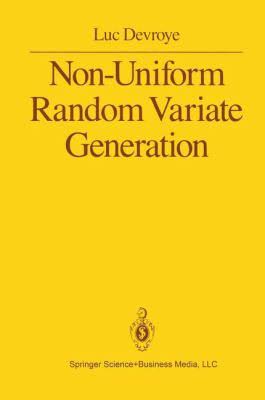
Non-Uniform Random Variate Generation
This book evolves around the expected complexity of random variate generation algorithms. It sets up an idealized computational model, introduces the notion of uniformly bounded expected complexity, and studies bounds for computational complexity.
Tag(s): Operations Research
Publication date: 31 Dec 1986
ISBN-10: n/a
ISBN-13: n/a
Paperback: 857 pages
Views: 22,265
Non-Uniform Random Variate Generation
 This book evolves around the expected complexity of random variate generation algorithms. It sets up an idealized computational model, introduces the notion of uniformly bounded expected complexity, and studies bounds for computational complexity.
This book evolves around the expected complexity of random variate generation algorithms. It sets up an idealized computational model, introduces the notion of uniformly bounded expected complexity, and studies bounds for computational complexity.
Tag(s):
Operations Research
Publication date: 31 Dec 1986
ISBN-10: n/a
ISBN-13: n/a
Paperback: 857 pages
Views: 22,265
Document Type: N/A
Publisher: Springer-Verlag GmbH
License: n/a
Post time: 02 Jan 2007 10:07:13
Publication date: 31 Dec 1986
ISBN-10: n/a
ISBN-13: n/a
Paperback: 857 pages
Views: 22,265
Document Type: N/A
Publisher: Springer-Verlag GmbH
License: n/a
Post time: 02 Jan 2007 10:07:13
Terms and Conditions:
Book Excerpts:
This text is about one small field on the crossroads of statistics, operations research and computer science. Statisticians need random number generators to test and compare estimators before using them in real life. In operations research, random numbers are a key component in large scale simulations. Computer scientists need randomness in program testing, game playing and comparisons of algorithms.
The applications are wide and varied. Yet all depend upon the same computer generated random numbers. Usually, the randomness demanded by an application has some built-in structure: typically, one needs more than just a sequence of independent random bits or independent uniform [0,1] random variables. Some users need random variables with unusual densities, or random combinatorial objects with specific properties, or random geometric objects, or random processes with well defined dependence structures. This is precisely the subject area of the book, the study of non-uniform random variates.
The plot evolves around the expected complexity of random variate generation algorithms. This book sets up an idealized computational model (without overdoing it), introduces the notion of uniformly bounded expected complexity, and studies upper and lower bounds for computational complexity. In short, a touch of computer science is added to the field. To keep everything abstract, no timings or computer programs are included.
Luc Devroye wrote:As the book is out of print, the copyright and ownership is mine, so I do with it what I want. On these web pages, you will find a fine scan of my book in text searchable PDF format (thanks, HK). This is the original text. A list of errata is here.
Furthermore, I give anyone the permission, even without asking me, to take these PDF files to a printer, print as many copies as you like, and sell them for profit. If you would like me to advertise the sales points of the hard copies, please let me know. To the libraries: Please do not charge patrons for copying this book. I grant everyone the right to copy at will, for free.
Book Excerpts:
This text is about one small field on the crossroads of statistics, operations research and computer science. Statisticians need random number generators to test and compare estimators before using them in real life. In operations research, random numbers are a key component in large scale simulations. Computer scientists need randomness in program testing, game playing and comparisons of algorithms.
The applications are wide and varied. Yet all depend upon the same computer generated random numbers. Usually, the randomness demanded by an application has some built-in structure: typically, one needs more than just a sequence of independent random bits or independent uniform [0,1] random variables. Some users need random variables with unusual densities, or random combinatorial objects with specific properties, or random geometric objects, or random processes with well defined dependence structures. This is precisely the subject area of the book, the study of non-uniform random variates.
The plot evolves around the expected complexity of random variate generation algorithms. This book sets up an idealized computational model (without overdoing it), introduces the notion of uniformly bounded expected complexity, and studies upper and lower bounds for computational complexity. In short, a touch of computer science is added to the field. To keep everything abstract, no timings or computer programs are included.
Tweet
About The Author(s)
No information is available for this author.
Book Categories
Computer Science
Introduction to Computer Science
Introduction to Computer Programming
Algorithms and Data Structures
Artificial Intelligence
Computer Vision
Machine Learning
Neural Networks
Game Development and Multimedia
Data Communication and Networks
Coding Theory
Computer Security
Information Security
Cryptography
Information Theory
Computer Organization and Architecture
Operating Systems
Image Processing
Parallel Computing
Concurrent Programming
Relational Database
Document-oriented Database
Data Mining
Big Data
Data Science
Digital Libraries
Compiler Design and Construction
Functional Programming
Logic Programming
Object Oriented Programming
Formal Methods
Software Engineering
Agile Software Development
Information Systems
Geographic Information System (GIS)
Mathematics
Mathematics
Algebra
Abstract Algebra
Linear Algebra
Number Theory
Numerical Methods
Precalculus
Calculus
Differential Equations
Category Theory
Proofs
Discrete Mathematics
Theory of Computation
Graph Theory
Real Analysis
Complex Analysis
Probability
Statistics
Game Theory
Queueing Theory
Operations Research
Computer Aided Mathematics
Supporting Fields
Web Design and Development
Mobile App Design and Development
System Administration
Cloud Computing
Electric Circuits
Embedded System
Signal Processing
Integration and Automation
Network Science
Project Management
Operating System
Programming/Scripting
Ada
Assembly
C / C++
Common Lisp
Forth
Java
JavaScript
Lua
Rexx
Microsoft .NET
Perl
PHP
R
Python
Rebol
Ruby
Scheme
Tcl/Tk
Miscellaneous
Sponsors